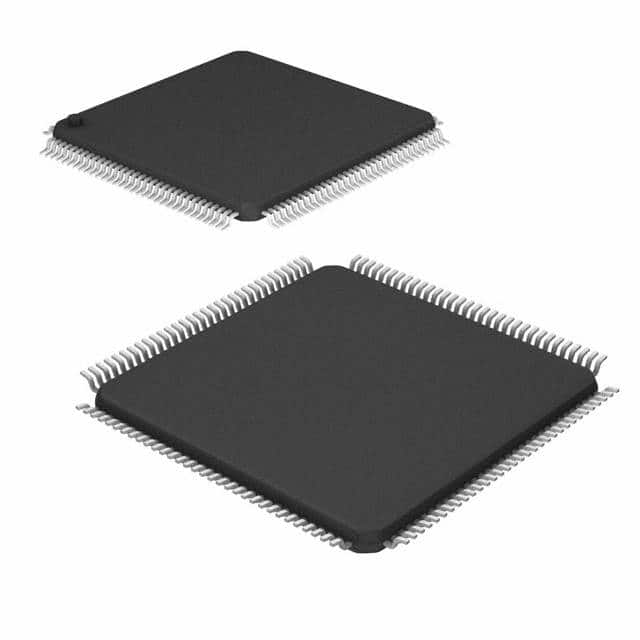TMS320LBC57PBK80
Overview
Product Category
TMS320LBC57PBK80 belongs to the category of digital signal processors (DSPs).
Use
This product is primarily used for signal processing applications in various industries such as telecommunications, audio and video processing, industrial automation, and medical imaging.
Characteristics
- High-performance DSP with advanced signal processing capabilities
- Low power consumption and high-speed operation
- Integrated peripherals for seamless system integration
- Flexible architecture allowing for customization and optimization
Package
TMS320LBC57PBK80 is available in a compact and durable package suitable for surface mount technology (SMT) assembly. The package ensures reliable performance even in harsh operating conditions.
Essence
The essence of TMS320LBC57PBK80 lies in its ability to efficiently process complex signals, enabling real-time analysis and manipulation of data. It offers a powerful solution for demanding signal processing tasks.
Packaging/Quantity
This product is typically packaged in reels or trays, depending on the quantity ordered. The packaging ensures safe transportation and storage of the components.
Specifications
- Architecture: 32-bit fixed-point DSP
- Clock Speed: Up to 80 MHz
- Instruction Set: Highly optimized for signal processing algorithms
- Memory: On-chip memory for program code and data storage
- Peripherals: Integrated interfaces for communication and control
- Power Supply: Wide voltage range for compatibility with different systems
- Operating Temperature: -40°C to +85°C
Detailed Pin Configuration
The TMS320LBC57PBK80 has a total of 100 pins, each serving a specific purpose in the overall functionality of the DSP. The pin configuration includes dedicated pins for power supply, clock input, memory interface, peripheral connections, and general-purpose input/output (GPIO) pins.
For a detailed pin configuration diagram, please refer to the product datasheet.
Functional Features
- Advanced signal processing algorithms for efficient data manipulation
- Multiple integrated peripherals, including UART, SPI, I2C, and GPIO
- DMA controller for high-speed data transfer
- On-chip memory management unit (MMU) for efficient memory utilization
- Real-time operating system (RTOS) support for multitasking applications
Advantages and Disadvantages
Advantages
- High-performance DSP architecture for demanding signal processing tasks
- Low power consumption, making it suitable for portable and battery-powered devices
- Integrated peripherals reduce the need for external components
- Flexible architecture allows customization and optimization for specific applications
Disadvantages
- Limited availability of alternative models with similar specifications
- Steep learning curve for developers unfamiliar with DSP programming concepts
- Higher cost compared to general-purpose microcontrollers
Working Principles
TMS320LBC57PBK80 operates on the principles of digital signal processing. It uses mathematical algorithms to manipulate and analyze digital signals in real-time. The DSP's architecture is optimized for efficient execution of signal processing tasks, enabling high-speed computations and accurate results.
Detailed Application Field Plans
TMS320LBC57PBK80 finds application in various fields, including:
- Telecommunications: Signal processing in wireless communication systems, base stations, and network infrastructure.
- Audio and Video Processing: Real-time audio and video encoding/decoding, noise cancellation, and image enhancement.
- Industrial Automation: Control systems, robotics, motor control, and machine vision.
- Medical Imaging: Ultrasound imaging, MRI signal processing, and patient monitoring systems.
Detailed and Complete Alternative Models
While TMS320LBC57PBK80 offers a unique combination of features and performance, there are alternative models available in the market that cater to similar requirements. Some notable alternatives include:
- TMS320C6748: Another high-performance DSP with similar capabilities.
- ADSP-21489: A digital signal processor from Analog Devices offering comparable performance.
- STM32F4 series: Microcontrollers with DSP extensions suitable for signal processing applications.
These alternative models provide developers with options to choose the most suitable solution based on their specific requirements.
In conclusion, TMS320LBC57PBK80 is a powerful digital signal processor designed for demanding signal processing applications. Its high-performance architecture, integrated peripherals, and flexibility make it an ideal choice for various industries. While it may have some limitations, its advantages outweigh the disadvantages, making it a valuable tool for signal processing engineers.
רשום 10 שאלות ותשובות נפוצות הקשורות ליישום של TMS320LBC57PBK80 בפתרונות טכניים
Sure! Here are 10 common questions and answers related to the application of TMS320LBC57PBK80 in technical solutions:
Q: What is TMS320LBC57PBK80? A: TMS320LBC57PBK80 is a high-performance digital signal processor (DSP) from Texas Instruments, designed for applications requiring real-time signal processing.
Q: What are the key features of TMS320LBC57PBK80? A: Some key features include a 32-bit floating-point DSP core, integrated peripherals, on-chip memory, multiple communication interfaces, and low power consumption.
Q: What are the typical applications of TMS320LBC57PBK80? A: TMS320LBC57PBK80 is commonly used in applications such as audio and speech processing, industrial automation, motor control, medical imaging, and telecommunications.
Q: How can I program TMS320LBC57PBK80? A: TMS320LBC57PBK80 can be programmed using various development tools, including TI's Code Composer Studio IDE, which supports C/C++ programming languages.
Q: What is the maximum clock frequency of TMS320LBC57PBK80? A: The maximum clock frequency of TMS320LBC57PBK80 is typically 80 MHz, allowing for fast and efficient signal processing.
Q: Does TMS320LBC57PBK80 support external memory expansion? A: Yes, TMS320LBC57PBK80 supports external memory expansion through its external memory interface, allowing for increased storage capacity if needed.
Q: Can TMS320LBC57PBK80 communicate with other devices? A: Yes, TMS320LBC57PBK80 has multiple communication interfaces, including UART, SPI, I2C, and Ethernet, enabling seamless integration with other devices.
Q: What is the power consumption of TMS320LBC57PBK80? A: The power consumption of TMS320LBC57PBK80 depends on the operating conditions and the specific application, but it is generally designed to be low power.
Q: Are there any development boards available for TMS320LBC57PBK80? A: Yes, Texas Instruments offers development boards specifically designed for TMS320LBC57PBK80, providing a convenient platform for prototyping and testing.
Q: Where can I find additional resources and support for TMS320LBC57PBK80? A: You can find additional resources, documentation, software libraries, and technical support for TMS320LBC57PBK80 on the official Texas Instruments website.


